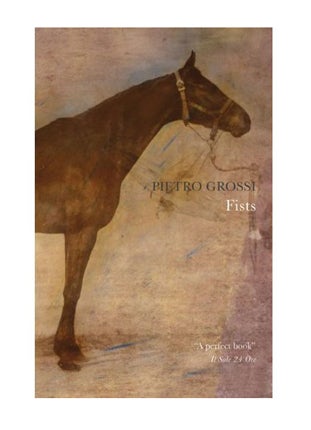Fists, By Pietro Grossi, trans. Howard Curtis
Three tales told with a noble art

Your support helps us to tell the story
From reproductive rights to climate change to Big Tech, The Independent is on the ground when the story is developing. Whether it's investigating the financials of Elon Musk's pro-Trump PAC or producing our latest documentary, 'The A Word', which shines a light on the American women fighting for reproductive rights, we know how important it is to parse out the facts from the messaging.
At such a critical moment in US history, we need reporters on the ground. Your donation allows us to keep sending journalists to speak to both sides of the story.
The Independent is trusted by Americans across the entire political spectrum. And unlike many other quality news outlets, we choose not to lock Americans out of our reporting and analysis with paywalls. We believe quality journalism should be available to everyone, paid for by those who can afford it.
Your support makes all the difference.Pietro Grossi's first book to appear in English has attracted two significant accolades: the Campiello Europe Prize and a short-listing for the Independent Foreign Fiction Prize.
It deserves the acclaim. Fists is a trio of short novellas, or long short stories, stand-alone but linked thematically, describing young men at transitional moments. With each experience the character's identity crystallises.
"Boxing" is as good a contemporary short story as I have read in years. A boy learns to box and proves to have the makings of a champion. He becomes known as the Dancer. The story builds towards a showdown with another young contender, the Goat. It's a tale of struggle (of body and will) and bittersweet success, of camaraderie between rivals and raw physicality. There is more power and pathos in this short piece of spare, timeless prose than in most densely-written novels.
"Horses" opens with two brothers receiving horses from their father. The brothers are unalike, their choices different, as are the places to which their horses take them. "The Monkey" sees Nico receive news that an old friend has started acting like a monkey. Crouching, grunting, playing with nutshells – the lot. At first his family think he's just messing around, but apparently not. Nico interacts with characters who mostly fail to engage with him – his agent, his girlfriend, his mother, a succession of women not quite plugged into his world.
Grossi's is a world where young men find and define their masculinity. Women are relegated to supporting parts. The narrator's mother in "Boxing" is little more than a conventional if necessary irritant; "Horses" is adorned with "the pharmacist's daughter", pretty and nameless.
Presenting three stories together invites us to seek connections. All present moments where the simplicities of childhood give way to the complexities of adult life, where a character who is still something of a boy becomes more of a man. The returns diminish somewhat. The third tale pivots on perhaps the most memorable image, the monkey-boy playing with nutshells, but it is also the least taut. All three tales are artful but seemingly effortless, a quality shared by Howard Curtis's translation, which feels elegantly natural. The whole written surface is clear and beautiful to read and there is plenty of depth beyond it too.
Join our commenting forum
Join thought-provoking conversations, follow other Independent readers and see their replies
Comments